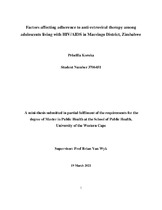| dc.contributor.advisor | Van Wyk, Brian | |
| dc.contributor.author | Koroka, Priscilla | |
| dc.date.accessioned | 2021-03-23T10:20:05Z | |
| dc.date.available | 2021-03-23T10:20:05Z | |
| dc.date.issued | 2021 | |
| dc.identifier.uri | http://hdl.handle.net/11394/8020 | |
| dc.description | Magister Public Health - MPH | en_US |
| dc.description.abstract | With the improvements in the effectiveness and availability of antiretroviral therapy (ART), perinatally infected children are surviving to adolescence and emerging as a significant sub-population living with HIV/AIDS in Zimbabwe. Adolescents, aged 10-19 years, face unique challenges related to adherence to chronic medication due to this period of vulnerability that is characterised by decreased parental support and supervision, decreased inhibition, increased risk-taking, and immature judgement. It is widely reported that poor adherence to ART leads to viral rebound, disease progression and drug resistance, in addition to increasing the risk of transmitting resistant strains of HIV to others. It is imperative to determine the factors that influence ART adherence among HIV positive adolescents so that effective interventions can be put in place. The current study described the factors that are associated with adherence to ART among HIV positive adolescents in Zimbabwe. | en_US |
| dc.language.iso | en | en_US |
| dc.publisher | University of the Western Cape | en_US |
| dc.subject | Adolescent | en_US |
| dc.subject | HIV | en_US |
| dc.subject | Antiretroviral therapy | en_US |
| dc.subject | Zimbabwe | en_US |
| dc.subject | Children | en_US |
| dc.subject | CD4 count | en_US |
| dc.title | Factors affecting adherence to anti-retroviral therapy among adolescents living with HIV/AIDS in Masvingo District, Zimbabwe | en_US |
| dc.rights.holder | University of the Western Cape | en_US |

